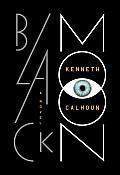BLACK MOON by Kenneth Calhoun
Dystopian lit is probably one of my favorite types of lit ever. More accurately, GOOD dystopian lit. Atwood’s The Handmaid’s Tale, McCarthy’s The Road, Orwell’s 1984… I mean, at this point, I’m just listing all the dystopian books I’ve read without throwing away because of boredom.
Here’s the deal: It’s the author’s freakin’ entire imagination. They LITERALLY create a different world, which, I mean, you can say about *all* literature, but with the dystopian stuff, it can get weird and crazy and we totally nod with it and see what the characters are gonna do / how they’ll interact in this new land we’ve all agreed exists somewhere in the future. So really, there’s nothing more disappointing when the author has so much freedom to make a new society and way of life and they simply make everything so blah.
I can’t even name novels that I feel this way about, since I threw them away instantly (there was some Hunger Games-esque series someone recommended once that was absolute scum and I hated it so much, my mind has literally blocked its title from my conscious mind at present), but examples of bad dystopian premises include: I am Legend, The Happening (is this even popular enough to be recognizable? Anyway, it was a M. Night Shyamalan film about Zooey Deschanel and Mark Wahlberg living in a world where plants sent out gases that made people commit suicide), and basically any other horror movie that ends with society adjusting to life alongside the Zombie apocalypse that doesn’t star Simon Pegg.
This is where Kenneth Calhoun’s Black Moon gets it so deliciously right. His is a world in maybe not even the future past 2015 (seriously – no weird advancements like operating systems that sound like Scarlett Johansson or flying cars) where the people are just hovering on the edge of becoming the frightening, flesh-eating zombies. They’re the insomniacs that have become the majority, the sleepless that count days rather than hours worth of sheep.
Basically, we get no explanation of how / why the sleeplessness starts. Suddenly, the world is filled with insomnia. In an eerie, Gabriel-Garcia-Marquez via One Hundred Years of Solitude way, it doesn’t kill them. They just… go on. Sure, they seek out cures and hopes in any place with a half-way convincing promise, but mostly, they slowly get confused in the way you’d except a person who hasn’t slept in a week and somehow hasn’t died would get. The only really scary part of their sleeplessness? It tricks their minds into believing one all-consuming lie: Sleep will return if they kill those who CAN still sleep.
Calhoun’s story focuses the most on the outliers, the people with the Catch-22 curse of sleep. From a little girl whose parents whisper about the way she hides underneath the bed to keep them from catching her snooze, to a girl surviving off an implant that shuts her off for the night, these people are either the luckiest or the worst off of this new earth. The benefits are obvious – these characters keep clean minds, basic human functions and have the edge over the insomniatic masses in tests of reflex or wit. On the flip side, they’re hunted down and hated like rabid dogs by those literally gone insane from jealousy and the voices in their heads.
How it works: Calhoun never resorts to zombie riff-raff nonsense. Even as the people grow slowly insane, the parents plot attempts to cut apart their sleeping daughter, wives have to be chained up to keep them from ripping apart their husbands as they sleep, they’re still deeply human. They still act as normal beings, good parents and all, whenever they’re NOT around sleepers; it’s just this sickness that pervades when they see someone with something they can’t have. You know, just basic human stuff, to a new sort of extreme level.
So I think that sets it up pretty well. Premise: The World Can’t Sleep. Plot: How do folks (the sleepers and the non) go on. Zombie Count: Zero. Emotions Twisting Your Gut Count: 8 out of 10. Really, if you liked any of the other books/movies I mentioned above (even low-budget Zooey films), you’ll love this book.






